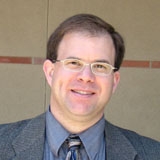
Date:
Location:
Title:
Abstract
Our lab has pursued development of synthetic methods to allow incorporation of unprecedented levels of functionality into polypeptide materials. We report on the design and properties of stimuli responsive polypeptide motifs that are able to respond differently to different individual stimuli, such as redox, temperature, or enzymes. These materials allow multimodal switching of polypeptide properties to obtain desirable features, such as coupled responses to multiple external inputs. The reversible, multi-responsive nature of these polypeptides makes them particularly attractive as components in molecular devices or nanoscale assemblies capable of sequential, or triggered, responses to different stimuli, akin to switches capable of performing Boolean-like operations. Initial efforts to incorporate these motifs into self-assembled materials such as hydrogels and vesicles for biological applications will be described.
Bio
Timothy J. Deming received a B.S. in Chemistry from the University of California, Irvine in 1989, and graduated with a Ph.D. in Chemistry from the University of California, Berkeley, in 1993. After a NIH postdoctoral fellowship at the University of Massachusetts, Amherst with David Tirrell, he joined the faculty in the Materials Department at the University of California, Santa Barbara in 1995. Here he held a joint appointment in the Materials and Chemistry Departments where he was promoted to Associate Professor in 1999 and Full Professor in 2003. His appointment is now as Professor of Bioengineering and Professor of Chemistry and Biochemistry at the University of California Los Angeles. He served as the Chairman of the Bioengineering Department at UCLA from 2006 to 2011. He is a leader in the fields of polypeptide synthesis, self-assembly of block copolypeptides, and use of polypeptides in biology, for which he has received awards from the National Science Foundation, the Office of Naval Research, The Arnold and Mabel Beckman Foundation, the Alfred P. Sloan Foundation, the Camille and Henry Dreyfus Foundation, the Materials Research Society, and the IUPAC Macromolecular Division. He is a Fellow of the American Institute of Medical and Biological Engineering, and recently received the Fulbright-Tocqueville Distinguished Chair Award.
Hosted by Cyrus Safinya. Download event flyer.



